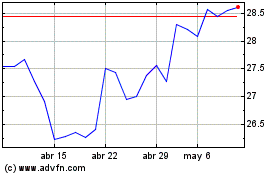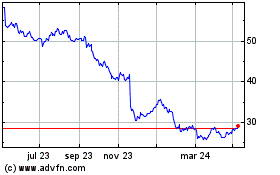Seller of Roundup blames surge on an advertising push by
plaintiff lawyers
By Ruth Bender
This article is being republished as part of our daily
reproduction of WSJ.com articles that also appeared in the U.S.
print edition of The Wall Street Journal (October 31, 2019).
BERLIN -- Bayer AG said the number of plaintiffs claiming its
Roundup herbicides caused cancer more than doubled to 42,700 in the
past three months, adding pressure on the company to resolve the
legal battle that has raised questions about its future.
The chemicals-to-pharmaceuticals company was thrown into one of
the worst crises in its 156-year-old history after its $63 billion
acquisition of Roundup inventor Monsanto Co. last year opened it up
to thousands of lawsuits about the herbicides.
Since August 2018, three juries have found the products caused
non-Hodgkin lymphoma, chopping roughly 30% off Bayer's market
value.
On Wednesday, the stock rose 2% after the company posted
better-than-expected sales and profit for the third quarter.
"Bayer is on track, both operationally and strategically," Chief
Executive Werner Baumann said.
Mr. Baumann, who has faced heavy criticism from shareholders,
highlighted progress the company has made in selling assets,
improving profitability and strengthening oversight of its legal
strategy.
The increase in Roundup plaintiffs, from 18,400 in early July,
comes as their lawyers and Bayer discuss a potential settlement.
Some investors, including activist hedge fund Elliott Management
Corp., have urged Bayer to consider settling.
Bayer had warned about a sharp rise in plaintiffs earlier in
October, but played down the significance, saying the numbers said
nothing about the size of any settlement payment or the merits of
the claims. It blamed the rise on an advertising push by lawyers
seeking to recruit more plaintiffs before any settlement is
reached.
Besides engaging "constructively" in settlement talks, Bayer has
continued to defend itself in appeals and would do so in any new
trial, Mr. Baumann told reporters Wednesday.
Bayer has argued that Roundup and its active ingredient
glyphosate are safe and that this view is backed by hundreds of
regulatory decisions around the world.
While some investors worry that the growing number of plaintiffs
could push up the final bill for Bayer, they also hold out the hope
that a settlement will be reached -- a prospect that has helped the
stock recover slightly since the start of this year. Several trials
scheduled to take place this summer and fall have been delayed,
suggesting that settlement talks are moving forward.
"We continue to think that a settlement is the most likely and
beneficial outcome for investors," Bernstein Research said in a
client note. Baader Bank's Markus Mayer said a settlement below $20
billion would be a positive share-price trigger.
Settling Bayer's legal liabilities is complicated, especially as
Roundup continues to be sold in stores, making it hard for the
company to achieve an agreement that would prevent future
plaintiffs from coming forward.
Mr. Baumann repeated Wednesday that the company would only agree
to a "financially reasonable" settlement. He slightly changed tone
on his view that any settlement should reach "finality," saying it
must come as close as possible to that goal.
Mr. Baumann declined to comment on the current state of the
talks. According to a person familiar with the mediation
discussions, Bayer and plaintiff lawyers are still far apart on the
amount and scope of a potential settlement.
The spike in plaintiffs has made a resolution even more
challenging, as Bayer faces more plaintiff lawyers, said Thomas
Claps, a litigation analyst for Susquehanna Financial Group.
Meanwhile, Bayer's business is improving. Sales in its
crop-science unit recovered from weakness in the second quarter,
growing 5.8% from a year earlier to EUR3.95 billion ($4.4 billion)
on strength in Latin America and North America. Overall sales rose
to EUR9.8 billion, slightly beating analysts' expectations,
according to estimates from FactSet. The number excludes the
company's animal-health business, which it is selling to Elanco
Animal Health Inc.
Sales in the pharmaceuticals unit, which counts for a little
more than half of group sales, rose 8.2% to EUR4.5 billion, driven
mostly by its two blockbuster drugs, blood thinner Xarelto and eye
treatment Eylea.
Net income dropped 65% to EUR1 billion, due mostly to a large
divestment gain recorded in the comparable period last year.
Bayer confirmed its full-year outlook of a 4% rise in sales. In
July, the company warned that severe weather affecting its
crop-science division could put its sales target out of reach.
Sara Randazzo contributed to this article.
Write to Ruth Bender at Ruth.Bender@wsj.com
(END) Dow Jones Newswires
October 31, 2019 02:47 ET (06:47 GMT)
Copyright (c) 2019 Dow Jones & Company, Inc.
Bayer (TG:BAYN)
Gráfica de Acción Histórica
De Mar 2024 a Abr 2024

Bayer (TG:BAYN)
Gráfica de Acción Histórica
De Abr 2023 a Abr 2024
